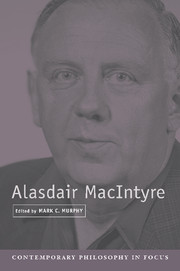Book contents
- Frontmatter
- Contents
- List of Contributors
- Introduction
- 1 Maclntyre on History and Philosophy
- 2 Tradition in the Recent Workof Alasdair MacIntyre
- 3 MacIntyre in the Province of the Philosophy of the Social Sciences
- 4 Modern(ist) Moral Philosophy and MacIntyrean Critique
- 5 MacIntyre and Contemporary Moral Philosophy
- 6 MacIntyre's Political Philosophy
- 7 MacIntyre's Critique of Modernity
- Bibliography
- Index
6 - MacIntyre's Political Philosophy
Published online by Cambridge University Press: 09 November 2009
- Frontmatter
- Contents
- List of Contributors
- Introduction
- 1 Maclntyre on History and Philosophy
- 2 Tradition in the Recent Workof Alasdair MacIntyre
- 3 MacIntyre in the Province of the Philosophy of the Social Sciences
- 4 Modern(ist) Moral Philosophy and MacIntyrean Critique
- 5 MacIntyre and Contemporary Moral Philosophy
- 6 MacIntyre's Political Philosophy
- 7 MacIntyre's Critique of Modernity
- Bibliography
- Index
Summary
In this chapter I will take up questions concerning MacIntyre's political thought as that thought has developed from After Virtue onward. MacIntyre's political thought is best understood in terms of its opposition to, and as an attempt to describe an alternative to, the political form that dominates modern life: the state. On MacIntyre's view, the modern state is trapped in a dilemma: it is unable to justify itself without bearing a substantive conception of the good, but the state is entirely unfit to bear a substantive conception of the good. State politics is indefensible, incoherent in theory and practice (section 1). A set of political institutions, to be rationally justifiable, will have to be able to sustain politics conceived as a practice and will have to be carried out locally within the enabling constraints set by the natural law (section 2). But there are serious questions to be raised concerning both MacIntyre's criticism of state politics and his endorsement of a politics of local community: it is unclear whether the state is as deeply flawed an institution as MacIntyre suggests and it is unclear whether the politics of local community, as MacIntyre describes it, is not itself deeply incoherent (section 3).
MacINTYRE'S CRITIQUE OF THE MODERN STATE
Just as MacIntyre takes the central task of moral philosophy to be that of accounting for the rational authority of morals (After Virtue, p. 52) – the failure of the Enlightenment project is just the failure to exhibit that authority– MacIntyre takes the central task of political philosophy to be that of accounting for the authority of political institutions.
- Type
- Chapter
- Information
- Alasdair MacIntyre , pp. 152 - 175Publisher: Cambridge University PressPrint publication year: 2003
- 10
- Cited by



